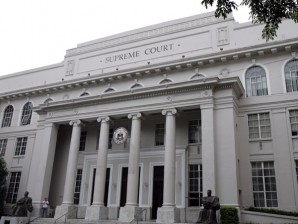MANILA, Philippines—The Supreme Court reversed Malacañang’s order and asked the reinstatement of the Ombudsman official accused of bribery by the Aug. 23 Quirino Grandstand hostage taker Rolando Mendoza.
In a 42 page decision released Tuesday penned by Associate Justice Estela Perlas-Bernabe, the high court also ordered the payment of back wages corresponding to the period of Emilio Gonzales’ suspension.
The high court added that while the Office of the President has the authority to discipline officials of the Office of the Ombudsman, an independent body from the Executive branch, “the administrative acts imputed to petitioner [Gonzales] falls short of the constitutional standard of betrayal of public trust.”
“The OP (Office of the President) pronouncement of administrative accountability against petitioner and the imposition upon him of the corresponding penalty of dismissal must be reversed and set aside, as of the findings of neglect of duty or misconduct in office do not amount to a betrayal of public trust. Hence, the President, while he may be vested with authority, cannot order the removal of petitioner as Deputy Ombudsman, there being no intentional wrongdoing of the grave and serious kind amounting to a betrayal of public trust,” the high court, through Bernabe, an Aquino appointee justice said.
Gonzales was dismissed from services by Malacañang following allegations that he delayed the resolution of the case against Mendoza. The Palace also took note of Mendoza’s allegation that Gonzales asked P150,000 in exchange for a favorable decision on his pending case.
Gonzales’ name was mentioned by Mendoza at the height of the hostage crisis in Quirino Grandstand where the late police officer took hostage Hong Kong tourists. After nine hours of hostage drama, Mendoza, along with several Hong Kong tourist ended up dead.
Gonzales denied the allegations against him but he was dismissed from services.
The high court said the findings of the Office of the President on negligence and misconduct on the part of Gonzales should be further investigated by the Ombudsman itself.
